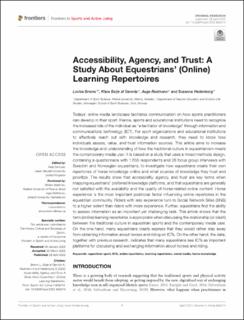| dc.contributor.author | Broms, Lovisa | |
| dc.contributor.author | Boije af Gennäs, Klara | |
| dc.contributor.author | Radmann, Aage | |
| dc.contributor.author | Hedenborg, Susanna | |
| dc.date.accessioned | 2022-11-29T08:41:56Z | |
| dc.date.available | 2022-11-29T08:41:56Z | |
| dc.date.created | 2022-08-31T09:40:18Z | |
| dc.date.issued | 2022 | |
| dc.identifier.citation | Frontiers in Sports and Active Living. 2022, 4, Artikkel 863014. | en_US |
| dc.identifier.issn | 2624-9367 | |
| dc.identifier.uri | https://hdl.handle.net/11250/3034659 | |
| dc.description | This is an open-access article distributed under the terms of the Creative Commons Attribution License (CC BY). The use, distribution or reproduction in other forums is permitted, provided the original author(s) and the copyright owner(s) are credited and that the original publication in this journal is cited, in accordance with accepted academic practice. No use, distribution or reproduction is permitted which does not comply with these terms. | en_US |
| dc.description.abstract | Todays' online media landscape facilitates communication on how sports practitioners can develop in their sport. Hence, sports and educational institutions need to recognize the increased role of the individual as “a facilitator of knowledge” through information and communications technology (ICT). For sport organizations and educational institutions to effectively reach out with knowledge and research, they need to know how individuals assess, value, and trust information sources. This article aims to increase the knowledge and understanding of how the traditional culture in equestrianism meets the contemporary media user. It is based on a study that uses a mixed methods design, containing a questionnaire with 1,655 respondents and 28 focus group interviews with Swedish and Norwegian equestrians, to investigate how equestrians create their own repertoires of horse-knowledge online and what sources of knowledge they trust and prioritize. The results show that accessibility, agency, and trust are key terms when mapping equestrians' preferred knowledge platforms, and that equestrians are generally not satisfied with the availability and the quality of horse-related online content. Horse experience is the most important positional factor influencing online repertoires in the equestrian community. Riders with less experience turn to Social Network Sites (SNS) to a higher extent than riders with more experience. Further, equestrians find the ability to assess information as an important yet challenging task. This article shows that the term (online) learning repertoires is appropriate when discussing the relationship (or clash) between the traditional culture in equestrian sports and the contemporary media user. On the one hand, many equestrians clearly express that they would rather stay away from obtaining information about horses and riding on ICTs. On the other hand, the data, together with previous research, indicates that many equestrians see ICTs as important platforms for discussing and exchanging information about horses and riding. | en_US |
| dc.language.iso | eng | en_US |
| dc.subject | equestrian sport | en_US |
| dc.subject | horse-knowledge | en_US |
| dc.subject | ICTs | en_US |
| dc.subject | learning repertoires | en_US |
| dc.subject | online repertoires | en_US |
| dc.subject | social media | en_US |
| dc.title | Accessibility, agency, and trust: A study about equestrians' (online) learning repertoires | en_US |
| dc.type | Peer reviewed | en_US |
| dc.type | Journal article | en_US |
| dc.description.version | publishedVersion | en_US |
| dc.rights.holder | © 2022 Broms, Boije af Gennäs, Radmann and Hedenborg | en_US |
| dc.source.pagenumber | 13 | en_US |
| dc.source.volume | 4 | en_US |
| dc.source.journal | Frontiers in Sports and Active Living | en_US |
| dc.identifier.doi | 10.3389/fspor.2022.863014 | |
| dc.identifier.cristin | 2047433 | |
| dc.description.localcode | Institutt for lærerutdanning og friluftslivsstudier / Department of Teacher Education and Outdoor Studies | en_US |
| dc.source.articlenumber | 863014 | en_US |
| cristin.ispublished | true | |
| cristin.fulltext | original | |
| cristin.qualitycode | 1 | |
